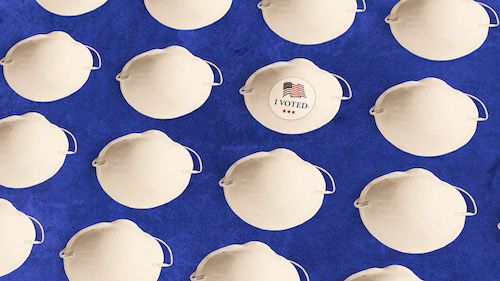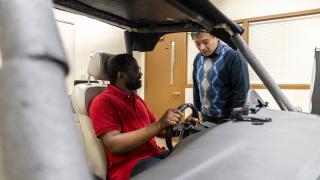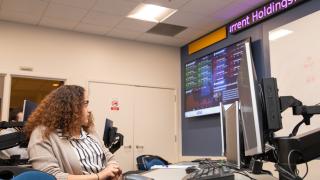Mitchel Sollenberger: Yes. Presidential elections can be postponed, but not canceled. There is no requirement in the Constitution that stipulates that a presidential election be held on a certain day.
The requirement to hold presidential elections on the first Tuesday of November originates from a 1845 law. As a result, Congress and the president could agree to delay the upcoming presidential election, but they must do so through the passage of a law.
R: If the presidential election is postponed, how long can it be delayed?
MS: The Constitution’s 20th Amendment sets the expiration date for presidential terms at noon on January 20 of each year following a presidential election. When you add that requirement to the fact that presidential terms are set at four years (Article II, section 1 of the Constitution) then it would appear that the latest the election can take place is December 31, 2020.
R: Ok. So there will be a 2020 election according to the Constitution. So let’s talk about the voters. No politician is responsible for a pandemic, but do you think COVID-19 will influence voters?
MS: It depends on timing,
President George H.W. Bush experienced high poll numbers and favorable views from the public on his handling of the 1991 Gulf War, but Operation Desert Storm ended in February 1991 — over eight months before the presidential election — and Bush ended up losing the 1991 presidential election to Bill Clinton.
It is now early April 2020, so will the COVID-19 emergency situation have an impact on this year’s presidential election? If the COVID-19 situation continues into the summer and beyond, the presidential election will most certainly be impacted. The question then becomes how do voters view President Trump’s management of the crisis compared to their confidence that Joe Biden would be a more effective leader?
The most clear evidence of the impact of COVID-19 on the election is in the polling numbers. However, polling numbers are often fleeting and change rapidly in a matter of months, if not weeks and days.
Let’s not forget that even if COVID-19 is first and foremost on people’s minds, the 2020 presidential election cannot escape other influencing factors. For example, will the longstanding ideological shift occurring within the Democratic Party affect the election? The leader of that movement, Sen. Bernie Sanders, recently bowed out of the Democratic primary. Will his voters turn out for a more moderate candidate like Joe Biden? The same question should be asked of never-Trump Republican voters. Will they vote for President Trump?
R: What are you seeing in the polls?
MS: It is safe to say that Democratic presidential presumptive nominee Joe Biden is struggling to find his place — and remain relevant — in the face of the COVID-19 crisis. The latest Washington Post/ABC News poll finds President Trump to have erased a seven-point deficit he had against Biden to nearly a tie. That same poll gives Trump its highest ever job approval rating of 48/46. That’s up eight points from a month ago. The Washington Post/ABC polling numbers match well with the Real Clear Politics aggregate average approval and disapproval rating for Trump which again shows signs that the president’s public standing is improving.
However, I’m saying this in early April with more than six months to go before the heart of the election season really heats up. The initial boast President Trump has experienced may prove to be temporary as seems to be suggested in the latest ABC/Ipsos poll where it shows a 47/52-percent approval of Trump’s handling of the COVID-19 crisis. That is an eight-point drop in approval since the last ABC/Ipsos poll was released on March 20. Still, I caution against making too much from any one poll as it is just too early in the election cycle to really tell the impact COVID-19 will have on the presidential race.
It’s important to keep in mind that presidential candidates running in elections during turbulent times still must face voters who have concerns over various public policy and political issues that are independent of the particular crisis the country is facing. Presidential candidates still must convince the voting public that their ideas and plans on healthcare, the economy or other salient issues are right for the country.
R: With the pandemic happening during primary season, states have handled voting in different ways. One of the most interesting was Wisconsin, which moved forward with plans for in-person primary voting April 8 after clashes in their state government made it all the way to the Supreme Court. What can we learn from this?
MS: Oh, boy. The Wisconsin election situation is troublesome. Lots of political, constitutional, legal and policy issues to unpack — these range from the authority of the governor to postpone an election via an executive order to the health and welfare concerns of Wisconsin’s voting citizens.
What I take away from the situation is the need for early, clear and direct action from political leadership which has oversight and authority over the election process. Not sure if that can happen in a political environment that is about as polarized as it can get, but it needs to happen. For upcoming elections — including the November presidential election — it is essential that federal and state officials begin now to discuss the health, safety, constitutional, legal and policy issues that need to be weighed and balanced against one another. Early polling by Reuters/Ipsos suggests a preference by the public for mail-in ballots. We need to consider such options now so a voting process can be put in place that effectively provides protections for individuals to vote safely during a pandemic.
I think the Wisconsin situation is best understood by contrasting it with how state elections were handled in Ohio. Wisconsin and Ohio had scheduled state-wide elections set for early April. Ohio’s Director of Health Amy Action issued an order on March 17 to postpone state elections. Her order —- based on state health and safety laws — was issued well in advance of the election and was upheld by the Ohio Supreme Court.
In contrast, Wisconsin Governor Tony Evers issued an executive order postponing state elections a day before they were scheduled to occur. Previously, Gov. Evers argued in an amicus brief that in-person state elections should proceed, but later reversed his position and requested that the Wisconsin legislature consider an all-mail election, which it refused to do. After issuing his executive order, Gov. Evers saw the Wisconsin Supreme Court quickly overturn it. The U.S. Supreme Court even got involved in a separate, but related, legal challenge to Wisconsin’s absentee ballot option — which included allowing absentee voting to continue after Election Day. That case arose out of a U.S. District Court for Western Wisconsin ruling, not Gov. Evers’s order. As you can see, there was a lot going on.
The takeaway from this is changing the election process should not be made on the eve of an election. Thinking ahead to the U.S. Presidential Election, we need to prepare now. Otherwise come November — if concerns over COVID-19 remain — the country may force its citizens to choose between going to the polls and risking their health and safety or staying home and potentially losing their right to vote.
R: Can you give us a historical perspective on politics during an election year while weathering a crisis?
MS: History has many examples of presidential elections that occurred during turbulent times.
Probably the earliest example was the 1799 presidential election between President John Adams, a member of the Federalist party, and Thomas Jefferson, a member of the Democratic-Republican party. It occurred during the Quasi-War with France. Some of the primary issues at that time centered on the powers of the federal government and the actions taken by the Federalist party in response to the growing opposition to the war. In particular, the Adams administration secured passage of the Alien and Sedition Acts, which were used to prosecute political opponents who spoke out against the war. Many felt this infringed on First Amendment Rights and these laws were very unpopular. Jefferson, who opposed the Alien and Sedition Acts and Adams’ policies, ended up winning the election.
Other presidential elections that either occurred during wartime or were impacted by crisis events include elections of 1812, 1832, 1848, 1864, 1920, 1932, 1968 and 2008 — just to name a few. But, in my view, none of the past presidential elections directly help inform our current situation because most crisis events centered on wars or economic recessions or depressions, not a global health pandemic. The Spanish Flu outbreak of 1918 occurred during an off-year election but it is the most relevant election when it comes to giving us some historical perspective and an understanding for the challenges this country may face come November. (Sollenberger says an article on Spanish Flu and lessons that can be learned was recently published in The New York Times).
Unfortunately, the 1918 election provides little insight in how a presidential race is impacted by a pandemic. However, it is not a reach to suggest that COVID-19 will affect the focus of voters on the question of presidential performance in the face of a crisis. If that’s the case then the election will likely be about which candidate convinces the public they are better able to lead the country moving forward. Will President Trump be seen in a similar light as past presidents such as Abraham Lincoln or Franklin D. Roosevelt who faced crisis events with resolve and determination? Or will the country want new political leadership and give Joe Biden the opportunity to lead?
It will be up to all of us to take stock of the situation and continue to pay attention to the actions and positions taken by Trump and Biden so far and in the months ahead.







